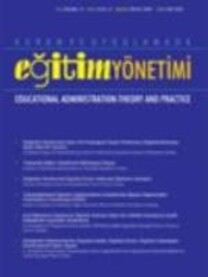Okul Yöneticilerininve Öğretmenlerin Değerlendirme Sürecinde Örgütsel Adalete İlişkin Görüşleri Üzerine Nitel Bir Araştırma
A Qualitative Investigation on the Views of School Principals and Teachers about Organizational Justice in Evaluation Process
___
- Akbaba-Altun, S. ve Memişoğlu, S. P. (2008). Performans değerlendirmesine ilişkin öğretmen, yönetici ve müfettiş görüşleri. Kuram ve Uygulamada Eğitim Yönetimi, (53), 7-24.
- Aktaş, E. ve Üner, N. (2010). Performans değerlendirme sistemlerinin örgütsel adalet algısı üzerine etkisi (Yayımlanmamış yüksek lisans tezi). Dokuz Eylül Üniversitesi, İzmir.
- Aydın, İ. (2014). Öğretimde denetim. Ankara: Pegem Akademi.
- Aydın, M. (2010). Eğitim yönetimi. Ankara: Hatiboğlu.
- Babaoğlan, E. ve Ertürk, E. (2013). öğretmenlerin örgütsel adalet algısı ile örgütsel adanmışlıkları arasındaki ilişki. Hacettepe Üniversitesi Eğitim Fakültesi Dergisi, 28(2), 87-101.
- Balcı, A. (2005). Sosyal bilimlerde araştırma: Yöntem teknik ve ilkeler. Ankara: Pegem Akademi.
- Balkar, B. ve Şahin, S. (2010). İlköğretim II. kademe öğretmenlerinin öğretmen performansını değerlendirme model ve uygulamalarına ilişkin görüşleri. İlköğretim Online, 9(1), 396-412.
- Başaran, İ. E. (1994). Eğitim yönetimi. Ankara: Kadıoğlu.
- Berg, B. L. (2001). Qualitative research methods for the social sciences. Boston: Allyn and Bacon.
- Beugr, C. D. (2002). Understanding organizational justice and its impact on managing employees: An African perspective. The International Journal of Human Resource Management, 13(7), 1091-1104.
- Bursalıoğlu, Z. (2000). Okul yönetiminde yeni yapı ve davranış. Ankara: Pegem Akademi.
- Büyüköztürk, Ş., Çakmak, E., Akgün, Ö. E., Karadeniz, Ş. ve Demirel, F. (2013). Bilimsel araştırma yöntemleri. Ankara: Pegem Akademi.
- Colquitt, J. A. (2001). On the dimensionality of organizational justice: A construct validation of a measure. Journal of Applied Psychology, 86, 386- 400.
- Çelebi, N., Vuranok, T. T. ve Turgut, I. H. (2015). İlk ve ortaokullarda öğretmenlerin ödül sistemine ilişkin görüşleri. Mehmet Akif Ersoy Üniversitesi Eğitim Fakültesi Dergisi, 34, 75-104.
- Erel, D. (1997). Başarım değerlemede adalet ve işgorenlerin doyumu. Ankara Üniversitesi Siyasal Bilgiler Fakültesi Dergisi, 52(1-4), 287-298.
- Eren, E. (2012). Örgütsel davranış ve yönetim psikolojisi. İstanbul: Beta.
- Eroğlu, Ş. G. (2014). Çalışanların örgütsel adalet algısının örgütsel güven üzerindeki etkileri. Pamukkale İşletme ve Bilişim Yönetimi Dergisi, 1(1), 53- 66.
- Folger, R. V., & Cropanzano, R. (1998). organizational justice and human resource management. USA: Saga Publications Inc.
- Folger, R. V., Cropanzano, R., & Konovsky, M. A. (1992). A due process metaphor for performance appraisal. Research in Organizational Behavior, 14, 129-177.
- Güney, S. (2011). Örgütsel davranış. Ankara: Nobel.
- Gürbüz, S. (2007). Yöneticilerin örgütsel vatandaşlık davranışlarının iş tatmini ve algıladıkları örgütsel adalet ile ilişkisi (Yayımlanmamış doktora tezi). İstanbul Üniversitesi, İstanbul.
- Irak, D. U. (2004). Örgütsel adalet: Ortaya çıkışı, kuramsal yaklaşımlar ve bugünkü durumu. Türk Psikoloji Yazıları, 7(13), 25-43.
- İnce, M. ve Gül, H. (2005). Yönetimde yeni bir paradigma: Örgütsel bağlılık. Konya: Çizgi.
- İşcan, Ö. F. ve Nakdiyok, A. (2004), Çalışanların örgütsel bağdaşımlarının belirleyicileri. Ankara Üniversitesi SBF Dergisi, 59(1), 181-201.
- Johnson, B. ve Christensen, L. (2014). Nicel, nitel ve karma araştırma (Çev. Ed. S. B. Demir). Ankara: Eğiten Kitap.
- Kuş, E. (2003). Nicel-nitel araştırma teknikleri. Ankara: Anı.
- MEB (2002). Okulda performans yönetimi taslak model. Ankara: MEB EARGED.
- Miles, M. B., & Huberman, A. M. (1994). Qualitative data analysis: An expande sourcebook. Thousand Oaks, CA: Sage.
- Nabatchi, T., Bingham, L. B., & Good, D. H. (2007). Organizational justice and workplace mediation: A six factor model. International Journal of Conflict Management, 18(2), 148-176.
- Oğuz, E. (2011). Öğretmenlerin örgütsel adalet algıları ile yöneticilerin liderlik stilleri arasındaki ilişki. İnönü Üniversitesi Eğitim Fakültesi Dergisi, 12(1), 45-65.
- Özgan, H. ve Bozbayındır, F. (2011). Okullarda adil olmayan uygulamalar ve etkileri. Dicle Üniversitesi Ziya Gökalp Eğitim Fakültesi Dergisi, 16, 66-85.
- Özmen, F. ve Üzmez, İ. T. (2007). Örgütsel etkililik açısından performans değerlendirme-iş ve eğitim örgütlerinde performans değerlendirme süreci. e-Journal of New World Sciences Academy, 2(1), 14-30.
- Polat, S. ve Celep, C. (2008). Ortaöğretim öğretmenlerinin örgütsel adalet, örgütsel güven, örgütsel vatandaşlık davranışlarına ilişkin algıları. Kuram ve Uygulamada Eğitim Yönetimi, 54, 307-331.
- Süzen, A. Z. (2007). İnsan kaynakları yönetim süreçleri çerçevesinde öğretmen değerlendirmesinde performans değerlendirme: Özel bir ilköğretim okulundaki sınıf öğretmenlerinin görüşleri (Yayımlanmamış yüksek lisans tezi). Eskişehir Anadolu Üniversitesi, Eskişehir.
- Şahin, B. ve Taşkaya, S. (2010). Sağlık çalışanlarının örgütsel adalet algılarını etkileyen faktörlerin yapısal eşitlik modeli ile incelenmesi. Hacettepe Sağlık İdaresi Dergisi, 13(2), 85-113.
- Şeşen, H. ve Basım, H. N. (2010). Çalışanların adalet algısının örgütsel vatandaşlık davranışına etkisi: İş tatmininin aracılık rolü. ODTÜ Geliştirme Dergisi, (37), 171-193.
- Tan, Ö. ve Çetin, C. (2011). Performans değerlendirme sistemine ilişkin örgütsel adalet algısının sistemden duyulan memnuniyet üzerindeki etkisini belirlemeye yönelik bir araştırma (Yayımlanmamış yüksek lisans tezi). Marmara Üniversitesi, İstanbul.
- Tuna, M. (2013). Örgütsel adalet: Kamu ve özel sektör kuruluşlarında bir araştırma. The Journal of Academic Social Science Studies, 6(8), 997-1023.
- Türnüklü, A. (2000). Eğitimbilim araştırmalarında etkin olarak kullanılabilecek nitel bir araştırma tekniği: Görüşme. Kuram ve Uygulamada Eğitim Yönetimi Dergisi, (24), 543-559.
- Yıdırım, M. C. (2008). İlköğretim okulu öğretmen ve yöneticilerinin öğretmenlerin ödüllendirilmesine ilişkin görüşleri. Kuram ve Uygulamada Eğitim Yönetimi, (56), 663-690.
- Yıldırım, A. ve Şimşek, H. (2011). Sosyal bilimlerde nitel araştırma yöntemleri (8. Baskı). Ankara: Seçkin.
- Yılmaz, K. (2008). Devlet ortaöğretim okullarında görev yapan öğretmenlerin örgütsel adalet algıları. Kuram ve Uygulamada Eğitim Yönetimi, (10), 579- 616.
- Yürür, Ş. (2008). Örgütsel adalet ile iş tatmini ve çalışanların bireysel özellikleri arasındaki ilişkileri analizine yönelik bir araştırma. Süleyman Demirel Üniversitesi İktisadi İdari Bilimler Fakültesi Dergisi, 13(2), 295-312.
- ISSN: 1300-4832
- Yayın Aralığı: 4
- Başlangıç: 1995
- Yayıncı: Pegem Akademi Yayıncılık Eğitim Danışmanlık Hizmetleri Tic. Ltd. Şti.
Okul İklimi ile Öğretmenlerin Özerklik Davranışları Arasındaki İlişki
İbrahim ÇOLAK, Yahya ALTINKURT
Okullardaki Paylaşılan Liderliğe İlişkin Ampirik Araştırmaların İncelenmesi
Okul Müdür Yardımcısı Görevlendirilmesine İlişkin Yönetici ve Öğretmen Görüşleri
NECDET KONAN, SALİH YILMAZ, Büşra BOZANOĞLU
